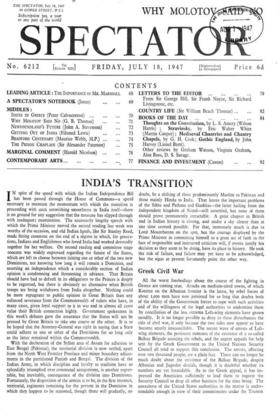INDIA'S TRANSITION
y N spite of the speed with which the Indian Independence Bill I has been passed through the House of Commons—a speed necessary to maintain the momentum with which the transition is proceeding with such astonishing smoothness in India itself—there is no ground for any suggestion that the measure has slipped through with inadequate examination. The necessarily lengthy speech with which the Prime Minister moved the second reading last week was worthy of the occasion, and old Indian hands, like Sir Stanley Reed, made fitting comment on the end of a regime in which, for genera- tions, Indians and Englishmen who loved India had worked devotedly together for her welfare. On second reading and committee stage concern was widely expressed regarding the future of the States, which are left to choose between joining one or other of the two new Dominions, not knowing how long it will remain a Dominion, and asserting an independence which a considerable section of Indian opinion is condemning and threatening in advance. That Britain should have had to default in its obligations to the Princes is deeply to be regretted, but there is obviously no alternative when British troops are being withdrawn from India altogether. Nothing could be more repugnant to public opinion in Great Britain than any enforced severance from the Commonwealth of rulers who have, in many cases, given loyal support to it in war and in almost all cases value their British connection highly. Government spokesmen in this week's debates gave the assurance that the States will not be pressed by Great Britain to take one course or the other. It is to be hoped that the Attorney-General was right in saying that a State could adhere to one or other of the Dominions for so long only as the latter remained within the Commonwealth.
With the declaration of the Sylhet area of Assam for adhesion to East Bengal (Pakistan), the territorial division is now settled, apart from the North West Frontier Province and minor boundary adjust- ments in the partitioned Punjab and Bengal. The division of the Indian Army, in which discipline and loyalty to tradition have so splendidly triumphed over communal antagonisms, is another regret- table, but inevitable, consequence of the division into Dominions. Fortunately, the disposition of the armies is to be, in the first instance, territorial, regiments remaining for the present in the Dominion in which they happen to be stationed, though there will gradually, no doubt, be a shifting of those predominantly Muslim to Pakistan and those mainly Hindu to India. That leaves the important problems of the Sikhs and Pathans and Gurkhas—the latter hailing from the independent kingdom of Nepal—still unsettled, but none of them should prove permanently intractable. A great chapter in British and in Indian history is closing, and under a sky clearer than at one time seemed possible. For that, immensely much is due to Lord Mountbatten on the spot, but the courage displayed by the Prime Minister in committing himself to a great act of faith in the face of responsible and instructed criticism will, if events justify his decision as they seem to be doing, have its place in history. He took the risk of failure, and failure may yet have to be acknowledged, but the signs at present fortunately point the other way.


































